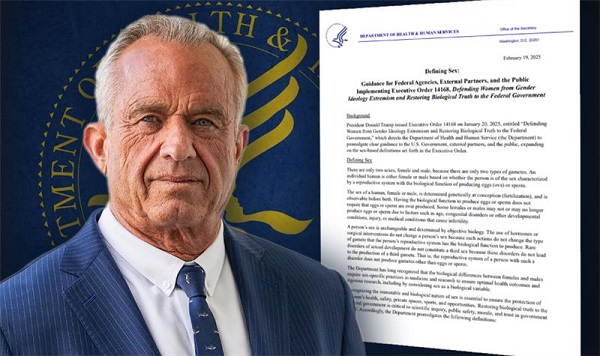Health
Trump HHS officially declares only two sexes: ‘Back to science and common sense’

From LifeSiteNews
The memo concludes by defining “female,” “male,” “woman,” “girl,” “man,” “boy,” “mother,” and “father” accordingly, based on observable scientific fact rather than subjective thoughts or feelings of gender dysphoria.
It is the official policy of the United States once more to maintain a biology-based definition of “sex” across all federal agencies, according to a new memo from the U.S. Department of Health & Human Services (HHS).
The February 19 memo lays out the understanding of sex and related terminology to be used for the purposes of interpreting and abiding by federal rules, regulations, and partnerships.
“There are only two sexes, female and male, because there are only two types of gametes,” it says. “An individual human is either female or male based on whether the person is of the sex characterized by a reproductive system with the biological function of producing eggs (ova) or sperm. The sex of a human, female or male, is determined genetically at conception (fertilization), and is observable before birth.”
Sex, the memo continues, “is unchangeable and determined by objective biology. The use of hormones or surgical interventions do not change a person’s sex because such actions do not change the type of gamete that the person’s reproductive system has the biological function to produce. Rare disorders of sexual development do not constitute a third sex because these disorders do not lead to the production of a third gamete.”
The memo concludes by defining “female,” “male,” “woman,” “girl,” “man,” “boy,” “mother,” and “father” accordingly, based on observable scientific fact rather than subjective thoughts or feelings of gender dysphoria.
“It took many years of effort but we are finally back to science and common sense,” reacted Roger Severino, former director of the HHS Office for Civil Rights (OCR) in the first Trump administration.
It is an article of progressive faith that gender is no more than a matter of self-perception that individuals are free to change at will. But according to modern biology, sex is not a subjective sense of self but an objective scientific reality, established by an individual’s chromosomes from their earliest moments of existence and reflected by hundreds of genetically based characteristics.
Yet for years LGBT activists have worked to promote “gender fluidity,” the idea that sexual identity is separate from biology and discernible only by personal perception, across public education, libraries, health care, and cultural traditions such as beauty contests, school homecomings, and athletic competitions.
Critics say their efforts have yielded a wide array of harms, both to the physical and mental health of gender-confused individuals themselves as well as to the rights, health, and safety of those who disagree, such as girls and women forced to share intimate facilities with males, female athletes forced to compete against biological males with natural physical advantages, and individuals forced to affirm false sexual identities in violation of their consciences, their understanding of scientific fact, and/or their religious beliefs.
Since returning to office, President Donald Trump has taken multiple executive actions to reverse the Biden administration’s transgender policies, including an order that ends all federal support for “transition” procedures on minors, rescinds or amends all of the Biden health bureaucracy’s past endorsements of underage “transitioning,” and calls for a review of the medical literature on the subject, enforcing all existing restrictions on underage “transitioning,” and taking regulatory action to “end” the practice to the greatest extent possible under current law.
Another order prohibits males who claim to be female from competing against actual women in sex-specific athletic programs at schools receiving government funding. A third disqualifies gender-confused individuals from military service and prohibits military health services from conducting “transition” treatments and procedures.
Health
Lack of adequate health care pushing Canadians toward assisted suicide

From LifeSiteNews
The family of an elderly man is speaking out about the terrible hospital conditions that led their father to request euthanasia before he died of natural causes.
The family of Cleo Gratton, an 84-year-old retired diamond driller who died earlier this month in Chelmsford, Ontario, of natural causes after being approved for assisted suicide, is speaking publicly about their appalling experience in the Canadian healthcare system.
According to the CBC, the elderly man “told his family he would rather die than go back to Health Sciences North in Sudbury,” and that a recent stay there found Gratton, who was suffering from heart disease and kidney failure, spending one night in the emergency room and then being transferred to a bed sitting in the hallway on the seventh floor.
“There were no lights, all the bulbs in that hallway had been completely removed,” his daughter, Lynn, told the CBC. “The only light we had was almost like a desk lamp that had been bolted to the wall. Patients are passing by, nurses are going by, no privacy, no compassion, no dignity.” The visit took place in mid-October, after which Gratton decided to apply for “medical aid in dying,” or assisted suicide.
Lynn said that nurses had to use headlamps to inspect her father’s feet, and that the experience was “just one thing after another and it really opened our eyes to what’s going on in our hospitals. My dad said, ‘Push, push, push for change. Make people aware of what’s gong on. Open the discussion, bring it to your MP, your MPP, keep going straight up.”
His family is now honoring his wishes to speak out about his experience. The doctors and nurses, Lynn emphasized, were “amazing,” but she noted that they seem overworked. “Why are they still taking in patients if we have an overcrowding issue and they have no place to put these people?” she said.
Cleo Gratton, who died of natural causes surrounded by his family before he could go through with assisted suicide, is just the most recent of many examples of Canadians opting for assisted suicide because they could not access the care that they actually desired.
In Quebec last year, Norman Meunier, a quadriplegic man, developed bedsores after four days left on an ER stretcher without a good mattress. That experience combined with lack of available homecare pushed him to request, and receive, assisted suicide.
An unnamed woman in her 80s, referred to in a MAID report as “Mrs. B,” received MAID earlier this year after requesting but being denied palliative or hospice care. Instead, with her spouse burning out as the result of her care, a rushed MAID assessment was completed, and she died by lethal injection.
In 2022, 44-year-old Winnipeg woman Sathya Dhara Khovac died by euthanasia after failing to receive the homecare resources she had desperately sought. In her posthumous obituary, she said she could have had more time if she’d had more help.
In 2019, 41-year-old Sean Tagert was euthanized after spending years attempting to find and fund the homecare and resources he needed to stay in the community where his son lived. He did not want to die but felt that he had no other choice.
And, among other stories, at least four Canadian veterans were offered assisted suicide in lieu of the unavailable mental health supports they were requesting.
Stories of Canadians seeking palliative care, mental health resources, homecare, and other medical support finding that the only option available to them is assisted suicide have become routine over the past several years. Euthanasia has become a pressure valve for an overworked and under-funded healthcare system serving an aging population increasingly need of complex care — and if assisted suicide for mental illness is legalize, things will get much, much worse.
Dr John Campbell
Cures for Cancer? A new study shows incredible results from cheap generic drug Fenbendazole

From Dr. John Campbell
You won’t hear much about Fenbendazole from the regular pipeline of medical information. There could be many reasons for that. For one, it’s primarily known for it’s use in veterinary medicine. Somehow during COVID the medical information pipeline convinced millions that if a drug is used on horses or other animals it couldn’t work for humans. Not sure how they got away with that one considering the use of animal trials for much of modern medical history.
Another possible reason, one that makes at least as much sense, is that there’s no business case for Fenbendazole. It’s been around for decades and its patent expired in the early 1990’s. That means it’s considered a generic drug that a pharmaceutical company from India could (and does) produce in mass quantities for very little profit (compared to non-generics).
So Fenbendazole is an inexpensive, widely accessible antiparasitic drug used in veterinary medicine. During the COVID pandemic a number of doctors, desperate for a suitable treatment, tried it with reportedly great levels of success. Over some time they discovered it might be useful elsewhere. Some doctors are using Fenbendazole to help treat late stage cancer. Often this is prescribed when the regular treatments clearly aren’t working and cancer is approaching or has already been declared stage 4.
What they’ve found at least in some cases is astounding results. This has resulted in a new study which medical researcher Dr. John Campbell shares in this video.
-

 espionage2 days ago
espionage2 days agoChinese-Owned Trailer Park Beside U.S. Stealth Bomber Base Linked to Alleged Vancouver Repression Case
-

 Daily Caller2 days ago
Daily Caller2 days agoUS Nuclear Bomber Fleet Shares Fence With Trailer Park Linked To Chinese Intel-Tied Fraudster
-

 Daily Caller2 days ago
Daily Caller2 days agoLaura Ingraham Presses Trump On Allowing Flood Of Chinese Students Into US
-

 Crime15 hours ago
Crime15 hours agoCBSA Bust Uncovers Mexican Cartel Network in Montreal High-Rise, Moving Hundreds Across Canada-U.S. Border
-

 Business2 days ago
Business2 days agoCarney’s Floor-Crossing Campaign. A Media-Staged Bid for Majority Rule That Erodes Democracy While Beijing Hovers
-

 Environment16 hours ago
Environment16 hours agoThe Myths We’re Told About Climate Change | Michael Shellenberger
-

 Alberta2 days ago
Alberta2 days agoChatGPT may explain why gap between report card grades and standardized test scores is getting bigger
-

 Business2 days ago
Business2 days agoCarney government needs stronger ‘fiscal anchors’ and greater accountability






